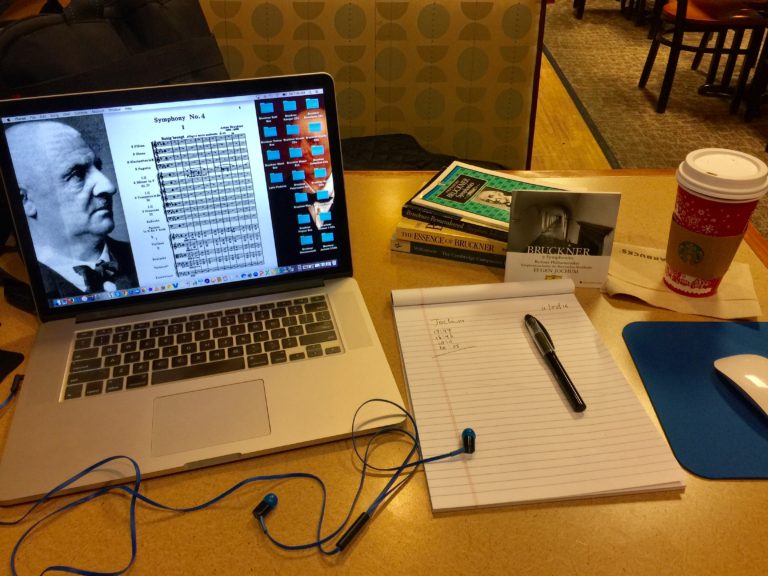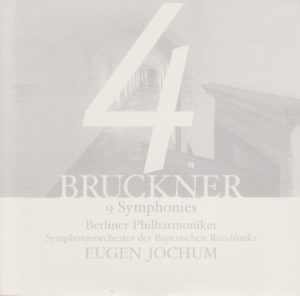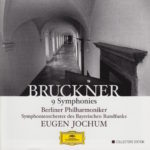 Got a booth in the cafeteria of a local grocery store (okay, it’s D&W), spread out my usual accoutrements, and now I’m ready to rock!
Got a booth in the cafeteria of a local grocery store (okay, it’s D&W), spread out my usual accoutrements, and now I’m ready to rock!
 This morning’s conductor of Anton Bruckner’s Symphony No. 4 in E Flat Major (WAB 104), titled “Romantic” by Bruckner himself, is German-born Eugen Jochum (1902-1987), unarguably one of the most highly respected interpreters of Anton Bruckner’s music who ever lived.
This morning’s conductor of Anton Bruckner’s Symphony No. 4 in E Flat Major (WAB 104), titled “Romantic” by Bruckner himself, is German-born Eugen Jochum (1902-1987), unarguably one of the most highly respected interpreters of Anton Bruckner’s music who ever lived.
I have two CD box sets conducted by Jochum – this one, on the DG label, and one on the Warner Classics label. I chose to listen to the symphony from the DG set before the one from the Warner Classics label because the DG-label recording is older. (I figured chronological order was a fair enough delineator.)
 I had the pleasure of hearing Eugen Jochum conduct the Berliner Philharmoniker three other times so far on my 144-day journey: on Day 6, Day 22, and – most recently – on Day 38.
I had the pleasure of hearing Eugen Jochum conduct the Berliner Philharmoniker three other times so far on my 144-day journey: on Day 6, Day 22, and – most recently – on Day 38.
Before I get too subjective about this morning’s recording, here are the nuts and bolts:
Bruckner’s Symphony No. 4 in E Flat Major composed in 1874
Eugen Jochum conducts
Jochum used the 1878/1880 version, edited by Robert Haas
Berliner Philharmoniker plays
The symphony clocks in 64:46
This was recorded in Berlin, Germany, in June of 1965
Jochum was 63 when he conducted it
Bruckner was 50 when he composed it
This recording was released on the Deutsche Grammophon Record Label
Of the 1878/1880 version, its entry on Wikipedia tells us this:
1880 version (aka 1878/1880)
After the lapse of almost a year (during which he composed his String Quintet in F Major), Bruckner took up his Fourth Symphony once again. Between 19 November 1879 and 5 June 1880 he composed a new finale – the third, though it shares much of its thematic material with the first version – and discarded the Volksfest finale. Thus the 1880 version is the same as the 1878 version but with a new finale. This was the version performed at the work’s premiere on 20 February 1881, which was the first premiere of a Bruckner symphony not to be conducted by Bruckner himself. This version is sometimes referred to as the 1878/80 version.
From the liner notes, written by Eugen Jochum:
There can be no doubt that the popularity of the Fourth Symphony is based on its style as much as on its expressive range, and on the immediacy of its melodies as much as on the enhanced radiance of its colours…It is quite possible that these features, combined with the composer’s love of the sound of horns and his obvious taste for the mysterious, were not the least of the reasons why he characterized his Fourth Symphony by the word “Romantic,” with its many meanings and associations.
Bruckner wrote his symphonies in four parts. The time breakdown of this one (Symphony No. 4 in E Flat Major, 1878/1880 version), from this particular conductor (Jochum) and this particular orchestra (Berliner Philharmoniker) is as follows:
I. Bewegt, nicht zu schnell (With motion, not too fast) (E-flat major)…………..17:44
II. Andante, quasi allegretto (C minor)…………………………………………………………..16:46
III. Scherzo. Bewegt (With motion) – Trio: Nicht zu schnell (Not too fast) (B-flat major)……………………………………………………………………………………………………………..10:11
IV. Finale: Bewegt, doch nicht zu schnell (With motion, but not too fast) (E-flat major)………………………………………………………………………………………………………………20.05
Total running time: 64:46
Okay. Now for the subjective stuff…
My Rating:
Recording quality: 4 (slight tape hiss)
Overall musicianship: 5
CD liner notes: 5 (two essays, one by Constantin Floros, one by Eugen Jochum, both translated into English, German, and French)
How does this make me feel: 5
Every time I listen to Eugen Jochum and the Berliner Philharmoniker I am transported.
This time, I find myself on some English countryside a century ago hearing the blowing horns of a hunt. I can almost smell the crushed fall leaves underneath, feel the snap in the air.
I don’t shout “Huzzah!” with this recording so much as drink it all in and cherish it.
This truly is a masterful interpretation, recorded well, played to perfection, and brimming over with the magic and mysticism that I’ve come to hear in Bruckner’s works.
Seriously, this is why I chose to spend 144 days straight listening to all nine of Bruckner’s symphonies. There’s something about his work that resonates with me the way Beethoven’s did when I listened to his works. (Beethoven is my favorite composer, with Mozart and Bruckner coming in second and third, respectively.)
I love the warmth and resonance of the horns, the pizzicato of the strings, the grand sweep and energy of the Scherzo (Movement III) and Finale (Movement IV).
Speaking of the Scherzo, I cannot listen to Movement III without thinking of Robin Hood. It makes me want to buckle a few swashes and chase after a king’s deer in Sherwood Forest.
“Huzzah!”
I couldn’t help myself.
